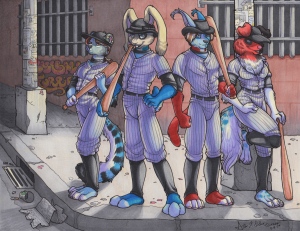Furries: A Convenient Comedic Fiction
My bar trivia team changes its name with each new tournament. Every few months, this becomes a ritual where I pitch a series of disgusting and/or esoteric names like Bridget Jones’s Diarrhea or Rod Torfulson’s Armada Featuring Herman Menderchuk and the group rolls their eyes as they reject my ideas. In the last go-around, I became insistent that we name ourselves after one of the gangs from the 1979 cult film The Warriors. For no particular reason, I especially wanted to be called The Baseball Furies. In a flash of brilliance and to my surprise, a teammate suggested that we be called The Baseball Furries – combining the fictional gang with the name for people whose sexual fetish is to dress up like a Care Bear.1
This was a good name for a trivia team, but considering their usual aversion to jokes that might offend, I was surprised that the team was amenable to this name. It was difficult for me to imagine naming our team after any minority group – sexual or otherwise. I had to conclude that everyone pretty much assumed there to be no furries in the bar, nor would there be any in our social groups that could possibly take offense.
Furries might exist somewhere, but nowhere, we assume, near us. It makes them a convenient reference for a laugh about other people’s perversion. And yet, our assumption that it is a minority group so small as to be nonexistent belies our and everyone else’s assumed familiarity with the practice. For a group that barely exists, there sure are a lot of people talking about furries. This is why the group is “fictional” – the amount of discourse that surrounds furry-ism immeasurably outweighs the reality of its practice. That it is other people’s perversion is key. Furry fetishism is so far off the radar of seemingly possible sexuality that it has come to stand in as a marker for sexual deviance in comedy. It is a common target for television comedies like The Drew Carey Show, Entourage, and Check It Out with Dr. Steve Brule. And in a comic twist on “rule 34,” furry culture is the topic of a lot of internet mockery.2
In an episode of 30 Rock, unlucky-in-love Liz Lemon finds a seemingly great guy who is single. Too good to be true? Yes – he’s a furry. This is reminiscent of the “all the good men are gay” sitcom trope where a woman falls for a gay man. One variation of this trope, which became the basis for Will and Grace, has a female character only realize at a humiliatingly late moment that her crush is gay. The key difference between Grace and Liz, however, is that while Will’s sexuality allowed the pair to easily reformulate their relationship as friends, Liz was so horrified at the prospect of furry-ism that it was borderline unimaginable for her to spend any more time with this man. And as the primary surrogate for the audience, it was implied that the we too should be comically horrified by the prospect of explorations in furry sexuality. That kind of experimentation was Jenna’s domain.
It is difficult to imagine, in the current media environment, having a character like Liz Lemon be horrified by a homosexual. Homer Simpson could get away with homophobia in 1997, as long as he learned tolerance by the end of the program. Although homophobia still exists in American comedy, the kind that would blatantly encourage a kind of abject dread is not terribly common in contemporary mass media. This is due to a host of factors, notably general changing social mores as well as more pointed calls for responsible representation by gay rights groups. Jokes constantly change their particulars while maintaining a common structure. That some gay jokes have shifted their target to furries is thus less notable than the fact that jokes have shifted from an identifiable group to a practically unidentifiable one.
And this is neither only nor simply an issue of redirected homophobia. Jeffrey Sconce provocatively suggests that “the unconscious is slowly dying out” in part because of, “the Internet’s ability to actualize any and all erotic scenarios in seconds.” From a Freudian standpoint, the lack of an unconscious would obviate the need for humor or sexual shame, so why do we seem stubbornly stuck with jokes at the expense of furries? Furry jokes demonstrate at least some aspect of the unconscious is alive and that it is desperately trying to Other furries in an attempt to normalize the things of which we are all silently ashamed. We need furries because they make your internet browser history seem less embarrassing. But beware. Once that stuff becomes normalized, there will be few places left to go for the thrill of perversion. Someday, we will all become furries.
1I am aware that sex is supposedly only a part of this subculture, but let’s be honest – that’s how everyone thinks about this group. Read on in any case, because this relates to my point.
2Rule 34 states that on the internet, if it exists, there is porn of it.
Wendy Davis: Humorous responses in a time of passionate political debate
Tracy Wuster
Over the past few weeks here in Austin, Texas, the issue of women’s health and abortion restrictions has been front and center, becoming a national story with the dramatic filibuster of SB5 by Wendy Davis (along with Kirk Watson, Judith Zaffrini, Leticia Van De Putte, Sylvester Turner, and others). Thousands of protesters filled the capital building, hundreds of thousands of people watched online (while CNN discussed blueberry muffins), and Wendy Davis became a national celebrity. Witnessing these events from both inside the capital and online, I was struck by the intense passion on both sides of the issue and by the ways in which humor might both express and relieve the tension that passionate political debate creates.
I understand that the issue of abortion is sensitive, so I will stick with the humorous responses to the issue. What struck me, as an observer, was the swift creation of humorous memes, the jokes on twitter, and the use of humor within the filibuster itself.
In the Archives: William Hazlitt, “On Wit and Humour” (1818)
Tracy Wuster
 For this month’s installment of “In the Archives,” we are featuring “On Wit and Humour,” the printed version of a lecture by William Hazlitt, the influential essayist and critic of the nineteenth century. Hazlitt’s essay was often cited in discussions of humor throughout the century by English and American scholars and humorists.
For this month’s installment of “In the Archives,” we are featuring “On Wit and Humour,” the printed version of a lecture by William Hazlitt, the influential essayist and critic of the nineteenth century. Hazlitt’s essay was often cited in discussions of humor throughout the century by English and American scholars and humorists.
I have excerpted a few selections below. For the whole essay, please see the version at the site of Maarten Maartensz, a Dutch philosopher and psychologist, who prepared a corrected version of the text. His critiques of GoogleBooks and their preparations of texts raises relevant questions about the preparation and use of digital archives.
The first two paragraphs of the essay seem especially important:
On Wit and Humour.
Man is the only animal that laughs and weeps; for he is the
only animal that is struck with the difference between what
things are, and what they ought to be. We weep at what
thwarts or exceeds our desires in serious matters: we laugh at
what only disappoints our expectations in trifles. We shed tears
from sympathy with real and necessary distress; as we burst
into laughter from want of sympathy with that which is unrea-
sonable and unnecessary, the absurdity of which provokes our
spleen or mirth, rather than any serious reflections on it.To explain the nature of laughter and tears, is to account for
the condition of human life; for it is in a manner compounded
of these two! It is a tragedy or a comedy — sad or merry, as it
happens. The crimes and misfortunes that are inseparable from
it, shock and wound the mind when they once seize upon it,
and when the pressure can no longer be borne, seek relief in
tears : the follies and absurdities that men commit, or the odd
accidents that befal them, afford us amusement from the very
rejection of these false claims upon our sympathy, and end in
laughter. If everything that went wrong, if every vanity or– 2 –
weakness in another gave us a sensible pang, it would be hard
indeed : but as long as the disagreeableness of the consequences
of a sudden disaster is kept out of sight by the immediate oddity
of the circumstances, and the absurdity or unaccountableness
of a foolish action is the most striking thing in it, the ludicrous
prevails over the pathetic, and we receive pleasure instead of
pain from the farce of life which is played before us, and which
discomposes our gravity as often as it fails to move our anger or
our pity !
Voter ID Laws and the Question of Political Satire
Tracy Wuster
Most of the time, politics is a serious business. People tend to take the government fairly seriously–our laws, our government, our rights. True, traditionally Congress has been an object of fun, and politicians–from Abraham Lincoln to Sarah Palin–have been the butt of jokes. But the importance of political humor–from parody to cartoons to satire–might best be seen as a reflection of how seriously people take politics.
In this highly political year, I have been very interested in questions of how political humor functions in American society. Recently, I discussed the satire of the RNC and DNC conventions on the Daily Show. Similarly, Self Deprecate’s contributions to our site and his site have tackled the current state of political humor.
One political issue that I have been increasingly concerned with this year is distinctly not funny: voter suppression. While proponents of voter ID and other voting laws argue that voter fraud is a real issue (apart from their clownish attempts to prove voter fraud by committing voter fraud), critics of these laws have argued that they are better explained as politically motivated efforts to suppress the votes of people of color, the poor, and the elderly. As John Dean argued in a blog post entitled, “The Republican’s Shameless War on Voting“:
There is absolutely no question that Republicans are trying to suppress non-whites from voting, throughout the Southern states, in an effort that has been accelerating since 2010. It is not difficult to catalogue this abusive Republican mission, which unfortunately has spread, in a few instances, to states above the Mason-Dixon Line as well.
Other stories back up this argument:
Harold Meyerson on the Washington Post
Charles Blow in the New York Times
Recent developments in voter laws in Texas, Ohio, Pennsylvania, and other states also testify to the seriousness of this issue. Those with any historical sense hear echoes of past efforts to restrict suffrage for political gain and based on cultural prejudice. Serious stuff.
Where does the humor come in?
Let’s start with Gary Trudeau’s “Doonesbury” strip from July 23 of this year:
And from the next day:
And check out the rest of the series: here, here, here , and ending with this one:
But that wasn’t all…












